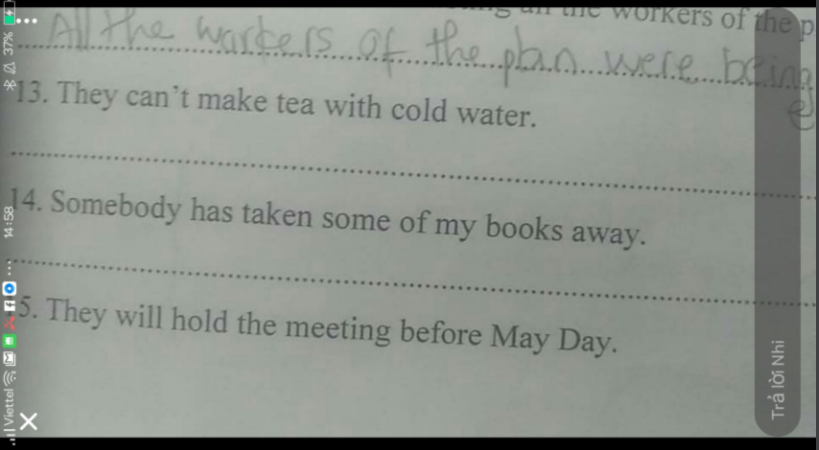Chuyển câu sang bị động giúp em với 7. I drank beer-> 8. She ate apples->

Những câu hỏi liên quan
1. He draws picture2. They play games-3. She buys books-4. She meets him-5. I sing songs-6. We learn English-7. I drink beer8. She eats apples-2.Quá khứ đơn1.I ate an apple last night-2.We sang Karaoke -3. They built houses-4. She drew pictures-5.Lan drank beer.-6. Lan and Hue Played the piano....Giải hộ em với ạ . Em cảm ơn trước
Đọc tiếp
1. He draws picture=>
2. They play games->
3. She buys books->
4. She meets him->
5. I sing songs->
6. We learn English->
7. I drink beer=>
8. She eats apples->
2.Quá khứ đơn
1.I ate an apple last night->
2.We sang Karaoke ->
3. They built houses->
4. She drew pictures->
5.Lan drank beer.->
6. Lan and Hue Played the piano.=>...
Giải hộ em với ạ . Em cảm ơn trước
1. He draws picture=> Picture is drew by him
2. They play games-> Games are played by them
3. She buys books-> Books are bought by her
4. She meets him-> Him is met by her
5. I sing songs-> Songs are sang by me
6. We learn English-> E is leant by us
7. I drink beer=> beer is drank by me
8. She eats apples-> Apples are ate by her
2.Quá khứ đơn
1.I ate an apple last night-> An apple was ate by me last night
2.We sang Karaoke -> K was sang by us
3. They built houses-> Houses were built by them
4. She drew pictures-> Pictures were drew by her
5.Lan drank beer.-> Beer was drank by Lan
Đúng 1
Bình luận (1)
chuyển sang câu bị đọng
4. How much can you pay them?
8. The lawyer will give him the details of his uncle’s will.
9. I gave Tony the note.
10. She sent me some apples yesterday.
How much can they be paid?
He will be given the details of his uncle's will by the lawyer
Tony was given the note
I was sent some apples by her yesterday
Đúng 2
Bình luận (0)
Chuyển các câu sau sang câu bị động:1. I often buy flowers for her in this shop2. She doesnt eat bread for breakfast3. Do you sometimes drink beer?4. The teacher correct our exercises at home5. The teacher always help us6. Mr.Phuoc often meets An on the way to school7. My sister doesnt do the housework everyday8. Her children dont tidy the house each day9. Does he never eat beef?10. Do you sometimes write a dictation?
Đọc tiếp
Chuyển các câu sau sang câu bị động:
1. I often buy flowers for her in this shop
2. She doesn't eat bread for breakfast
3. Do you sometimes drink beer?
4. The teacher correct our exercises at home
5. The teacher always help us
6. Mr.Phuoc often meets An on the way to school
7. My sister doesn't do the housework everyday
8. Her children don't tidy the house each day
9. Does he never eat beef?
10. Do you sometimes write a dictation?
Chuyển các câu sau sang câu bị động:
1. I often buy flowers for her in this shop
-> Flowers are often bought for her in this shop.
2. She doesn't eat bread for breakfast
-> Bread isn't eaten for breakfast.
3. Do you sometimes drink beer?
-> Is beer sometimes drunk?
4. The teacher corrects our exercises at home
-> Our exercises are corrected at home by the teacher.
5. The teacher always help us
-> We are always helped by the teacher.
6. Mr.Phuoc often meets An on the way to school
-> An is often met on the way to school by Mr. Phuoc.
7. My sister doesn't do the housework everyday
-> The housework isn't done by my sister everyday.
8. Her children don't tidy the house each day
-> The house isn't tidied by her children each day.
9. Does he never eat beef?
-> Is beef never eaten?
10. Do you sometimes write a dictation?
-> Is a dictation sometimes written?
Đúng 4
Bình luận (0)
1 Flowers are often bought for her in this shop by me
2 Bread isn't eaten by her for breakfast
3 Is beer sometimes drunk by you?
4 Our exercises are corrected at home by the teacher
5 We are always helped by her
6 An is often met by Mr Phuoc on the way to school
7 The housework isn't done by my sister everyday
8 The house isn't tidied each day by her children
9 Is beef ever eaten by him?
10 Is a dictation sometimes written by you?
Đúng 3
Bình luận (9)
em chưa rõ về chuyển câu chủ động sang câu bị động, với câu wish. Mong giúp em
1) Form of Passive Cấu trúc câu bị động:
Subject + finite form of to be + Past Participle
(Chủ ngữ + dạng của động từ “to be” + Động từ ở dạng phân từ 2) Example: A letter was written.
Khi chuyển câu từ dạng chủ động sang dạng câu bị động:
Tân ngữ của câu chủ động chuyển thành chủ ngữ của câu bị động. Ví dụ: Active: He punished his child. -> Passive: His child was punished. (Anh ta phạt cậu bé.) (Cậu bé bị phạt)
Câu chủ động ở dạng thì nào, chúng ta chia động từ “to be” theo đúng dạng thì đó. Chúng ta vẫn đảm bảo nguyên tắc chủ ngữ số nhiều, động từ “to be” được chia ở dạng số nhiều, chủ ngữ số ít thì động từ “to be” được chia ở dạng số ít.
Present simple (Hiện tại đơn) The car/cars is/are designed.Present perfect (HT hoàn thành) The car/cars has been/have been designed.Past simple (Quá khứ đơn) The car/cars was/were designed.Past perfect (Qk hoàn thành) The car/cars had been/had been designed.Future simple (Tương lai đơn) The car/cars will be/will be designed.Future perfect (TL hoàn thành) The car/cars will have been designedPresent progressive (HT tiếp diễn) The car/cars is being/are being designed.Past progressive (Qk tiếp diễn) The car/cars was being/were being designed.2) WishWish ở hiện tại
Để diễn đạt một mong muốn ở hiện tại, chúng ta dùng cấu trúc:
S + wish + thì quá khứ .
Eg : I wish I knew the answer to this question. (at present i don't know the answer)
I wish I didn't have so much work to do . (I do have a lot of work)
2. Wish ở quá khứ
Để diễn đạt một mong muốn ở quá khứ, chúng ta dùng:
S + wish + The Past perfect.
Eg : I wish I had gone to your party last week. (I did not go).
3. Wish ở tương lai
+ Chúng ta có thể dùng "could" để diễn đạt mong muốn về một việc nào đó ở tương lai.
Eg : I wish Jane could meet me next week.
+ Chúng ta cũng có thể cùng "could" để diễn tả một việc nhìn chung rất khó có thể thực hiện, không khả thi.
Eg : I wish I could contact him, but I don't have my mobile phone with me.
+ Chúng ta cũng có thể dùng "have to" để nói về mong muốn một việc trong tương lai
Eg : I wish I didn't have to get up early tomorrow.
Đúng 0
Bình luận (0)
- Động từ wish được dùng để diễn tả một điều ước ở hiện tại, tương lai hoặc quá khứ.
- Có 3 dạng điều ước:
+ Điều ước ở hiện tại
+ Điều ước ở tương lai
+ Điều ước ở quá khứ
I. ĐIỀU ƯỚC Ở HIỆN TẠI
- Điều ước ở hiện tại được sử dụng để diễn tả một mong muốn không có thật ở hiện tại.
- Công thức:
Wish + Past Simple (quá khứ đơn)
Wish + Past Continuous (quá khứ tiếp diễn)
Ví dụ (1): I wish I had a car (In fact, I don’t have a car now).
(Tôi ước gì có một chiếc xe hơi. Thực tế tôi không có xe hơi).
Ví dụ (2): I wish it weren’t raining now (In fact, it is raining now).
(Tôi ước gì trời không mưa. Thực tế trời đang mưa).
* Chú ý: Với động từ TO BE “were” được dùng cho tất cả các ngôi. Tuy nhiên trong văn nói vẫn có thể dùng “was”
Ví dụ: I wish it wasn’t / weren’t raining now.
II. ĐIỀU ƯỚC Ở TƯƠNG LAI
- Điều ước ở tương lai được sử dụng để phàn nàn hoặc diễn tả một mong muốn trong tương lai.
- Công thức:
Wish + would / could + V
Wish + were going to + V
Ví dụ (1): I wish I could attend the course next month (In fact, I can’t attend).
(Tôi ước tôi có thể tham gia vào khóa học tháng tới. Thực tế tôi không thể tham gia).
Ví dụ (2): I wish I weren’t going to visit her next week (In fact, I am going to visit her next week).
(Tôi ước gì tuần tới tôi không đến thăm cô ấy. Thực tế tôi sẽ đến thăm cô ấy).
Ví dụ 3: I wish you wouldn’t put your clothes everywhere.
(Ước gì bạn không vứt quần áo lung tung nữa).
* Chú ý: điều ước ở tương lai thường có công thức:
A + wish + B + would / could + V
III. ĐIỀU ƯỚC TRONG QUÁ KHỨ
- Điều ước trong quá khứ được sử dụng để diễn tả một tình huống đã không xảy ra trong quá khứ.
- Công thức:
Wish + Past Perfect (quá khứ hoàn thành)
Wish + Past Perfect Continuous (quá khứ hoàn thành tiếp diễn)
Wish + Perfect Conditional (would / could / might + have + PP)
Ví dụ (1): I wish you had come to my birthday party (In fact, you didn’t come).
(Tôi ước cậu đã tham dự bữa tiệc sinh nhật của tôi. Thực tế cậu không đến).
Ví dụ (2): I wish I hadn’t been working for her at that time (In fact, I was working for her at that time)
(Tôi ước vào thời điểm đó không làm việc cho cô ấy. Thực tế tôi đang làm việc cho cô ấy)
Ví dụ (3): I wish you could have seen that film. (In fact, you couldn’t see that film).
(Ước gì bạn đã xem bộ phim đó. Thực tế bạn đã không xem).
IV. WISH + TO DO / WISH SB ST / WISH SB TO DO ST
Ví dụ: I wish to pass the exam (tôi ước gì mình sẽ đỗ kỳ thi đó)
I wish you happy birthday (chúc sinh nhật vui vẻ)
I wish you to become a good doctor (chúc cậu sẽ trở thành một bác sỹ giỏi).
V. IF ONLY
- If only (giá mà, giá như) có thể được dùng thay cho động từ wish nhưng mang sắc thái biểu cảm hơn.
Ví dụ: If only you were here. (Giá như giờ này anh ở đây).
Đúng 0
Bình luận (0)
mn lm giúp em với ạ. đề bài chuyển sang câu bị động ạ 
13 Tea can't be made with cold water
14 Some of my books have been taken away
15 The meeting will be held before May Day
Đúng 2
Bình luận (0)
13 TEA CAN'T BE MADE WITH COLD WATER
14SOME OF MY BOOKS HAVE BEEN TAKEN AWAY
Đúng 1
Bình luận (1)
Xem thêm câu trả lời
chuyển câu chủ động sang câu bị động we had thought carefully before we gave our decision. giúp em với ạ...
![]()
We had thought carefully before our decision was given out
Đúng 2
Bình luận (1)
BÀI 3: Chuyển các câu câu sau sang các thể còn lại (khẳng định, phủ định, nghi vấn): 6. Last Sunday, I went fishing with my dad. 7. I had a good party last night. 8. Did you do karate this morning ? 9. Two hours ago, she ate at her favourite restaurant. 10. I was at school this morning. 11. They weren’t happy yesterday.
6.
-.Last Sunday, I didn't go fishing with my dad
?.Did you go fishing with your dad last Sunday?
7.
-.I didn't have a good party last night.
?.Did you have a good party last night?
8.
+.I did karate this morning
-.I didn't do karate this moring
9.
-.Two hours ago, she didn't eat at her favourite restaurant
?.Did she eat at her favourite restaurant two hours ago?
10.
-.I wasn't at school this morning
?.Were you at school this morning?
11.
+.They were happy yesterday.
?.Were they happy yesterday?
Đúng 0
Bình luận (0)
6. Last Sunday, I went fishing with my dad.
=>Last Sunday, I didn't go fishing with my dad.
7. I had a good party last night.
=> I had not a good party last night.
8. Did you do karate this morning ?
=>You didn't do karate this morning?
9. Two hours ago, she ate at her favourite restaurant.
=>Two hours ago, she didn't eat at her favorite restaurant.
10. I was at school this morning.
=>I was not at school this morning.
11. They weren’t happy yesterday.
=> They were happy yesterday.
Đúng 0
Bình luận (0)
Chuyển các câu sau sang dạng bị động
1. John collects money.
2. Anna opened the window.
3. We do our homework.
4. I asked you a question.
5. He cut out the picture.
6. The sheep ate a lot.
7. We do not clean our rooms.
8. William does not repair the car.
9. Did Sue draw this circle?
10. Did you feed the dog?
11. He teaches English.
12. The child eats bananas every day.
13. She writes a letter.
14. The master punished the servant.
15. He wrote a...
Đọc tiếp
Chuyển các câu sau sang dạng bị động
1. John collects money.
2. Anna opened the window.
3. We do our homework.
4. I asked you a question.
5. He cut out the picture.
6. The sheep ate a lot.
7. We do not clean our rooms.
8. William does not repair the car.
9. Did Sue draw this circle?
10. Did you feed the dog?
11. He teaches English.
12. The child eats bananas every day.
13. She writes a letter.
14. The master punished the servant.
15. He wrote a book.
16. Who wrote this letter?
17. Somebody cooks meal every day.
18. He wore a blue shirt.
19. They are building a house.
20. I finished the job 2 hours ago.
21. I sent the report yesterday.
22. She bought a diamond necklace.
23. Somebody stole my purse.
1. John collects money.
Money is collected by John.
2. Anna opened the window.
The window was opened by Anna.
3. We do our homework.
Our homework is done.
4. I asked you a question.
You were asked a question.
5. He cut out the picture.
The picture was cut out.
6. The sheep ate a lot.
A lot was eaten by the sheep.
7. We do not clean our rooms.
Our rooms are not cleaned.
8. William does not repair the car.
The car isn't repaired by William.
9. Did Sue draw this circle?
Was this circle drawn by Sue?
10. Did you feed the dog?
Was the dog fed?
11. He teaches English.
English is taught.
12. The child eats bananas every day.
Bananas are eaten by the child every day.
13. She writes a letter.
A letter is written by her.
14. The master punished the servant.
The servant was punished by the master.
15. He wrote a book.
A book was written by him.
16. Who wrote this letter?
By whom was this letter written?
17. Somebody cooks meal every day.
Meal is cooked every day.
18. He wore a blue shirt.
A blue shirt was worn by him.
19. They are building a house.
A house is being built.
20. I finished the job 2 hours ago.
The job was finished 2 hours ago.
21. I sent the report yesterday.
The report was sent yesterday.
22. She bought a diamond necklace.
A diamond necklace was bought by her.
23. Somebody stole my purse.
My purse was stolen.
Bị động thì quá khứ đơn: S + was/were + PII + (by O)+.....
Bị động thì hiện tại đơn: S + am/is/are + PII + (by O)+....
Bị động thì hiện tại tiếp diễn: S + am/is/are + being + PII + (by O)+....
-Trạng từ chỉ nơi chốn/mục đích/ phương tiện/....... + by O + trạng từ chỉ thời gian.
-Trong câu bị động bắt buộc bỏ: by somebody, by someone, by no one, by nobody, by everybody, by everyone, by something, by everything, by nothing.
-Trong câu bị động có thể bỏ: by us, by me, by you, by her, by them, by it, by his.
#\(Errink\times Cream\)
#\(yGLinh\)
Đúng 4
Bình luận (0)
BỊ ĐỘNG VỚI NHỮNG ĐỘNG TỪ SAI BẢO.EXERCISE 4:CHUYỂN CÁC CÂU SAU SANG BỊ ĐỘNG.1.I had my nephew paint the gate last week.…………………………………………………………………………………………………………2.She will have Peter wash her car tomorrow.……………………………………………………………………………………………………………….3.They have her tell the story again.…………………………………………………………………………………………………..4.John gets his sister to clean his shirt.…………………………………………………………………………………………………………..5.Anne had had a friend type her composition.…………………………………………………………………………………………………………6.Rick w...
Đọc tiếp
BỊ ĐỘNG VỚI NHỮNG ĐỘNG TỪ SAI BẢO.
EXERCISE 4:CHUYỂN CÁC CÂU SAU SANG BỊ ĐỘNG.
1.I had my nephew paint the gate last week.
…………………………………………………………………………………………………………
2.She will have Peter wash her car tomorrow.
……………………………………………………………………………………………………………….
3.They have her tell the story again.
…………………………………………………………………………………………………..
4.John gets his sister to clean his shirt.
…………………………………………………………………………………………………………..
5.Anne had had a friend type her composition.
…………………………………………………………………………………………………………
6.Rick will have a barber cut his hair.
……………………………………………………………………………………………………………..
7.I will get the dressmaker to make a new dress.
……………………………………………………………………………………………………………..
8.He had a mechanic repair his car.
……………………………………………………………………………………………………………
9.She often gets the technician to maintain the heater.
……………………………………………………………………………………………
10.They had the police arrest the shoplifter.
……………………………………………………………………………….
11.Are you going to have the shoemaker repair your shoes?
………………………………………………………………………………………
12.I must have the dentist check my teeth.
…………………………………………………………………………………….
13.She will have a veterinary surgeon examine her dog.
……………………………………………………………………….
14.We had a man take this photograph when we were on holiday last summer.
……………………………………………………………………………………..
15.The Greens had a carpet cleaner clean their carpet.
……………………………………………………………………..
1. I had the gate painted last week
2. She will have her car washed tomorrow
3. They have the story told again
4. John gets his shirt cleaned
5. Anne had had her composition typed
6. Rick will have his hair cut
7. I will get a new dress made
8. He had his car repaired
9. She often gets the heater maintained
10. They had the shoplifter arrested
11. Are you going to have your shoes repaired?
12. I must have my teeth checked
13. She will have her dog examined
14. We had this photograph taken when we were on holiday last summer
15. The Greens had their carpet cleaned
Đúng 3
Bình luận (1)



























